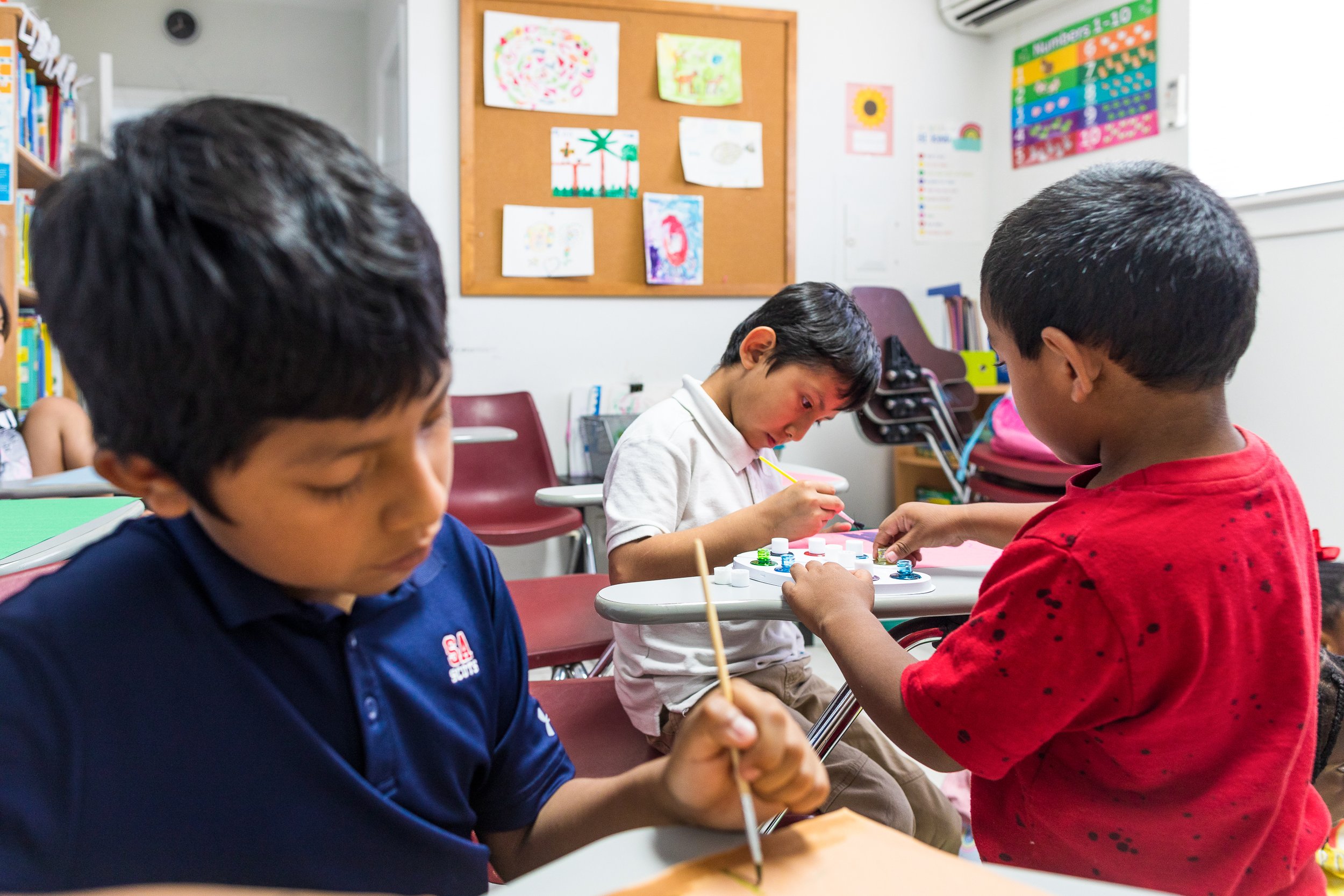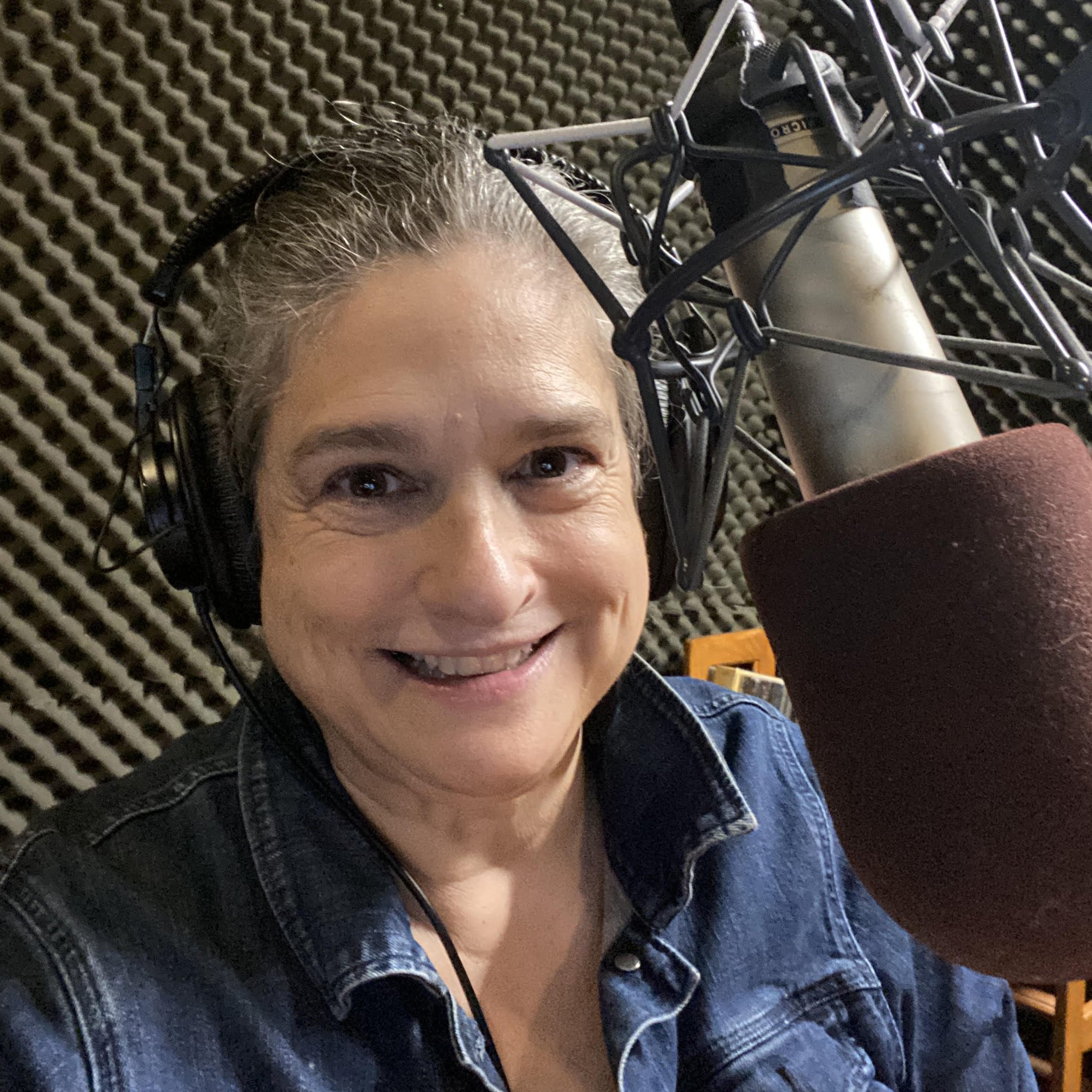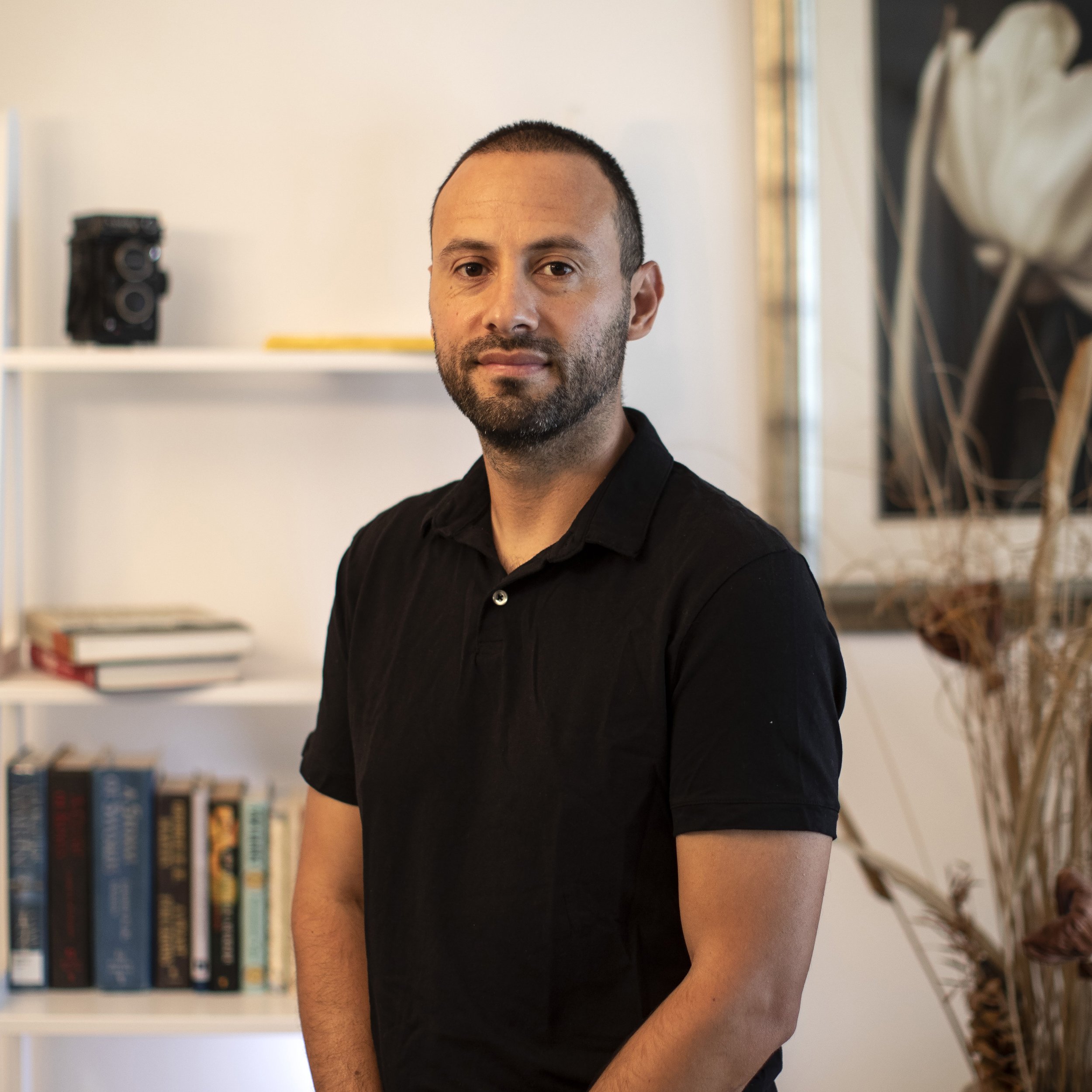Finding Home
Children of farmworkers participate in after-school programming at the Farmworker Coordinating Council of Palm Beach in Lake Worth, Florida. Photo by Saúl Martinez for palabra
How one nonprofit program in Florida is trying to shrink the academic and financial gaps for farmworker families
On a steamy spring morning in Lake Worth, Florida, with temperatures in the mid-80s, Alejandrina Velasquez arrives early for a 9:30 a.m. financial literacy class at the Farmworker Coordinating Council of Palm Beach County. Already, the 20 or so plastic chairs, arranged in a small parking lot, are full. Velasquez sits in the back of the makeshift classroom. Half a dozen toddlers, some playing games on their mothers’ phones, are here too. At times, the teacher pauses her instruction in Spanish because of the thunder of eighteen-wheelers on the nearby highway. She explains to the group of farmworker women that in “el sistema capitalista en este país” credit card companies may offer lines of credit to people unable to afford the payments.
Velasquez, 40, migrated about a decade ago to Lake Worth from the Guatemalan highlands, a region plagued by an internal war as she was growing up. In Palm Beach County, she has picked tomatoes and pumpkins under a hot sun, work that has supported her five children. She has no formal schooling. Her parents sent their sons to school, but not their daughters. Still, she said, life in Lake Worth is “mucho mejor” than in Guatemala.
The Council has been a sanctuary for Velasquez and her family, offering support for basic living needs and the comfort of being part of a community facing similar struggles.
At the nonprofit program, caseworkers tailor services around a family’s needs, said executive director Denise Negrón. Households qualify for services if they earn 30% below Palm Beach County’s median family income, which categorizes them as "extremely low income." That amount varies depending on household size, with a family of four needing to earn $27,750 or less to be considered for services. “The agency brings security to them that they don’t get anywhere else,” Negrón said.
Alejandrina Velasquez visits the Farmworker Coordinating Council to receive support for her family. Photo by Saúl Martinez for palabra
Denise Negrón, executive director at Farmworker Coordinating Council, at the Council’s facilities. Photo by Saúl Martinez for palabra
Along with financial literacy, the Council’s adult classes teach computer and English skills designed to boost families’ self-sufficiency and confidence. “We are teaching them basic things they need to know to make life easier in this country,” said Paola Velásquez, (no relation to Alejandrina), a psychologist who runs the Lake Worth education programs. For children, there is an after-school program that is deliberately small and includes language and cultural activities. Negrón cited a pen pal program with children in Latin America in which participants have had the opportunity in the past to write about their immigration experiences and their lives in Florida.
Palm Beach County is often associated with wealth. Former President Donald Trump's Mar-a-Lago resort is four miles from Lake Worth. Billionaire Bill Gates owns a horse ranch nearby. But the county is also home to a frequently overlooked farmworking community. Palm Beach County is an agricultural powerhouse, with $1.4 billion in annual sales from sugarcane, corn, and bell peppers, among other crops.
At least 15% of the estimated 2.4 million farmworkers in the United States migrate with the growing seasons. The challenges these workers and their children face are considerable, said Yumary Ruiz, an associate professor of public health at Purdue University, whose research focuses on vulnerable populations with an emphasis on youth. Ruiz and Zoe Taylor, an associate professor in Purdue’s Department of Human Development and Family Science, conducted research in rural Indiana on migrant children’s external circumstances and their inner lives. Their findings show that the children of migrant farmworkers face high levels of depression, anxiety, and economic stress. They spoke of negative experiences with fellow students and their teachers, along with educational disruptions such as having to leave school before the end of an academic year and starting in a new school weeks late.
Negrón, whose organization serves both migrant and settled farmworker families, says that “many (of the parents) don’t have any education.” Forty-five percent of her nonprofit’s clients are undocumented which, she said, often keeps people from seeking public assistance, including health services for heat strokes or accidents while working. “They are continually afraid of being deported,” she said.
In 1960, CBS News aired “Harvest of Shame,” a documentary about migrant farmworkers, particularly Black and white workers, and the reality that many of their children were not finishing school. The resulting public outcry helped lead to the establishment of the federal Migrant Education Program in 1965. The program provides grants to state school districts to ensure that “migrant children reach challenging academic standards and graduate with a high school diploma” or its equivalent. Jorge Echegaray manages the federal program in Palm Beach County, which offers about 2,300 children services ranging from preschool placement assistance and college tours to college scholarship assistance. “Academically, I think that we’re doing a lot,” Echegaray said. But, he added, broader challenges remain for migrant families, including a lack of technology at home, insufficient health care, and food insecurity. “Once our kids are home, they don't have the resources,” Echegaray said.
In an art enrichment activity at the Farmworker Coordinating Council, children model their artwork after artist Faith Ringgold’s narrative quilts. Photo by Saúl Martinez for palabra
Nationally, the drop-out rate for children whose parents migrate for farmwork averages 45% to 50% according to the U.S. Department of Education. Reasons include social and cultural isolation, poverty, and discontinuity in education. The Migrant Education Program dollars solely serve the children of migrant farmworkers who travel more than 75 miles for work.
Nonprofits like the Farmworker Coordinating Council of Palm Beach County, founded in 1978, are able to help a wider range of people, including family members of settled farmworkers, or families who travel less than 75 miles for work. The Council's funding comes from a mix of public funds, private donations, and foundation grants. Last year, the Council assisted 2,737 people with services from after-school tutoring and adult education classes to social support, such as emergency rental assistance and food. It covered one month of rent for Alejandrina Velasquez’s family after her partner was injured in a fall while fixing a trailer roof. She has taken three of her children to after-school classes run by the Council, where they have received homework assistance and art enrichment.
The nonprofit operates two sites. One, in Lake Worth, serves farmworkers who have mostly arrived from Guatemala and speak indigenous languages such as Mam, a Mayan language, said Paola Velásquez. A second site, in Belle Glade, on the western edge of Palm Beach County, largely serves farmworker families from Haiti and other parts of Latin America and the Caribbean. They harvest vegetables and sugarcane. (Belle Glade was the location for “Harvest of Shame.”)
Paola Velásquez plays with children of farmworkers at the Farmworker Council of Palm Beach. Photo by Saúl Martinez for palabra
As for the farmworker families, “this group of people for me is diamantes en bruto,” said Paola Velásquez. “I see a lot of potential here. They didn’t have access to high school or college and it’s not their fault. If they’re in the United States, then they want a better life for their children.”
On a recent afternoon at the Lake Worth site, Aurora Rincon, an artist from Venezuela, shows a small group of children photographs of narrative quilts — quilts that tell a story through patterns and imagery — by artist Faith Ringgold. Rincon then asks the children to make their own quilts out of paper. Rincon said the weekly art classes help children whose families are in survival mode to learn “how to create, how to make sure that they are confident about what they do.”
In the next room, Paola Velásquez plays with the younger children because none brought homework that particular day. But when they do, “they are learning to read,” Velásquez said. “They are learning fractions, to count by hundreds, to recognize centimeters and inches, those kinds of things.”
Lost in many public conversations about this group of children are the strengths they possess. “You look at newspapers, you look at articles, they often talk about Latino populations, how they are low educated, how there is high risk of substance use in this population, especially gangs, early sexual debut,” said Ruiz, the professor at Purdue. “There's never the other side of that coin told about this population.” In her research, Ruiz found that children were aware of their family’s struggles, but “were learning lessons from those hard experiences.”
Nory Ortega, Farmworker Coordinating Council scholarship recipient, works part time as a store clerk. She also works a full-time job at Lynn University, where she earned her master’s degree in business administration. Photo by Saúl Martinez for palabra
For farm working families, parental involvement can look a little different. School teachers and administrators may assume that a parent who doesn’t show up for a parent-teacher meeting or volunteer in their child’s class is indifferent to academic success, Ruiz said. But work schedules and limited English skills can preclude participation in school activities.
The jagged path to success that the children of migrant farmworkers must follow is clear on a recent Tuesday evening at Hola Fuel on South Military Trail in Lake Worth. Behind the counter, Nory Ortega, in jeans and a Hola work shirt, sells lottery tickets, soda, and gas to a stream of customers. Ortega began working here eight years ago, while she was in college. She continues to work part time even after earning a master’s degree in business administration and holding a second job in the admissions office at her alma mater, Lynn University in Boca Raton. Ortega’s parents are former migrant farmworkers who followed crops in Florida with their children in tow. Eventually, her parents settled into local jobs, her dad landscaping and her mother cleaning houses.
Nory Ortega and her parents, former migrant farmworkers, in the front yard of the home she and her husband purchased for the family. Photo by Saúl Martinez for palabra
Ortega participated in Palm Beach County’s Migrant Education Program and, by the time she was in high school, she was engaging in community service and participating in program-sponsored college tours. She also discovered the Farmworker Coordinating Council of Palm Beach County, which awarded her a college scholarship. Her mother also took computer classes at the Council until her work schedule made it too difficult.
The gas station where Ortega currently works is a few blocks from the trailer where she and her family lived after arriving from Mexico. It’s near the one-story house she and her husband bought a couple of years ago, where they now live with Ortega’s parents, her brother, and an uncle.
Ortega’s story is a bright spot among the hurdles farmworker families face. In a WhatsApp conversation, Alejandrina Velasquez said her challenges include the lack of a driving license, along with struggles to pay rent, water, electric, and other bills. A month ago, she stopped bringing her children to the Council’s after-school program because the ride they relied on to get there fell through. It’s too far to walk.
Still, Velasquez remains hopeful. “My dream is to see my kids one day grown up, with a profession, graduated, which is what I never had,” she said.
—
Allison Salerno is an independent multimedia journalist based in both Georgia and South Florida. Her work focuses on food, farming and social innovation. Allison finds threads of a story line that she then weaves together and shares of how larger economic and political forces affect regular people. Her work has appeared in The Washington Post, The Christian Science Monitor and on NPR stations.
Saúl Martinez is an independent freelance photographer and videographer based in South Florida. He specializes in documentary, portrait, editorial and news photography. Saúl’s vision and approach to his work flow allows him to document life in a creative, intimate, storytelling way through photographs. He has been working in Florida since 2017, for numerous publications. Before shifting over to freelance work, he was based in Central America since 2009 as a staff wire photographer for EFE and Reuters news agencies for ten years out of Guatemala City, Guatemala.











